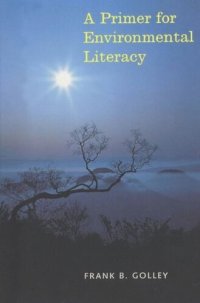
Ebook: A Primer for Environmental Literacy
Author: Maxim Gorky, Herman Ermolaev
- Year: 2003
- Publisher: Yale University Press
- Language: English
- pdf
This broad-ranging book presents the key concepts of environmental science in an accessible style that can be understood by those who are not natural scientists. It offers a way to improve environmental literacythe capacity to understand the connections between humans and their environment.
Unique in its breadth and simplicity, the book is also unusual in that it uses a "top-down" approach, starting with a global scale and proceeding to smaller units of organization until it reaches the individual organism. It is divided into four parts. The first introduces three core conceptsthe environment, the system, and environmental hierarchiesand applies these ideas to the earth as a system. The second focuses on land and water systems, beginning with the whole earth and ending with the ecotope (small-scale systems in which we work, live, and play). The third section is concerned with populations and individuals. The final section builds up from individuals to the biotic community. The book ends with an overview of human ecology and with general conclusions about the conditions of the biosphere. The book, which includes a reading list for each topic, is ideal for the student or general reader interested in learning more about the environment and how to value it.
Unique in its breadth and simplicity, the book is also unusual in that it uses a "top-down" approach, starting with a global scale and proceeding to smaller units of organization until it reaches the individual organism. It is divided into four parts. The first introduces three core conceptsthe environment, the system, and environmental hierarchiesand applies these ideas to the earth as a system. The second focuses on land and water systems, beginning with the whole earth and ending with the ecotope (small-scale systems in which we work, live, and play). The third section is concerned with populations and individuals. The final section builds up from individuals to the biotic community. The book ends with an overview of human ecology and with general conclusions about the conditions of the biosphere. The book, which includes a reading list for each topic, is ideal for the student or general reader interested in learning more about the environment and how to value it.
Download the book A Primer for Environmental Literacy for free or read online
Continue reading on any device:

Last viewed books
Related books
{related-news}
Comments (0)